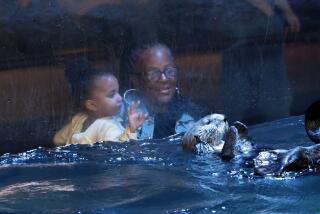THE DREAMS OF ZOO ANIMALS <i> by Valmai Howe (St. Martin’s: $15.95; 226 pp.) </i>
- Share via
Ever since Freud demonstrated that people actually do not grow apart from family when they come-of-age--they merely try to recreate as father and mother the social dynamics that ordered their lives as son and daughter--novelists concerned with individual freedom have been busy engineering ways for their characters to escape the familial trap. Most prominent among them today is John Fowles, whose dauntless heroines surmount even love to “find their freedom,” often making Jell-O out of noblemen in the process. Sarah, Valmai Howe’s protagonist, continues in this tradition, although at the beginning of this novel (which has been nominated for the Canadian Book Award), she emerges as the most gentle of girls: At her most mischievous, she takes a few sea creatures from rock pools as “prisoners,” carefully keeping them in water and returning them after an hour.
After taking a summer job as a maid at a resort to gain some distance from her dominating father, Sarah falls in love with Leon, the resort’s medical officer. An intense, lachrymose young man, Leon eventually suffers a nervous breakdown, however, breaking into a zoo the two had visited and killing a lion they had seen in a cramped cage “to put him out of his misery.” While Leon is in jail for the crime, Sarah decides to leave Australia and live permanently in America.
Sarah’s decision is presented as a courageous way of preventing herself from being subsumed by another, but it seems more likely to prevent her identity from fully flowering. Sarah’s personality, after all, is almost singularly defined by her caring, symbiotic relationship with Leon and several other friends; in departing so abruptly, she seems to contemn this central dimension of her identity. Sarah’s mistake lies in failing to realize that human character is defined in relation to other people, not in complete isolation from them.
“The Dreams of Zoo Animals” has other flaws--dialogue is often incidental, for example, and provocative issues are raised and then abruptly dismissed--but this novel remains compelling for its seemingly earnest text: believable, one suspects, because Howe, like Sarah, left Australia as a young adult to begin again in America.
More to Read
Sign up for our Book Club newsletter
Get the latest news, events and more from the Los Angeles Times Book Club, and help us get L.A. reading and talking.
You may occasionally receive promotional content from the Los Angeles Times.








